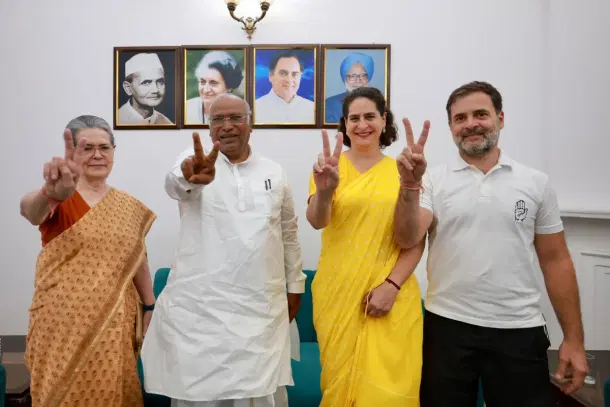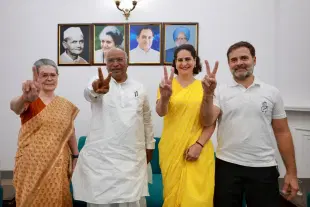Commentary
From Nehru To Rahul, Long History Of Politicising Institutions Betrays Congress' Convenient Activism
Samarth Seth and Tulika Bhattacharya
Sep 17, 2025, 02:38 PM | Updated 03:03 PM IST
Save & read from anywhere!
Bookmark stories for easy access on any device or the Swarajya app.


A tale of two narratives defines the Congress party’s engagement with the judiciary and other democratic institutions as it relates to its political gains. Unsurprisingly, the engagement is marked by a two-faced stance, praising institutions when outcomes align with the party’s agenda and undermining them when rulings or actions are unfavourable. This displays the duplicity of the Congress and its allies, twisting their stance with each shift in the political space.
This playbook of convenience was on full display in the aftermath of the 2024 General Elections and the November 2024 Maharashtra elections. The Congress-led opposition launched a frontal attack on the credibility of the electoral process in a press conference conducted by the Leader of Opposition, Rahul Gandhi, on 8 August 2025. As part of this conference, he attempted to weave a narrative alleging the Narendra Modi government of systematic vote chori.
These allegations, which came nearly a year after the declaration of the 2024 General Election results, were met by a responsive and comprehensive press conference by the Election Commission of India (ECI) on 17 August 2025. When the ECI offered clarifications, they were scornfully dismissed by senior Congress leaders as laughable and partisan. The message was clear: an institution that did not deliver a favourable outcome according to the Congress was deemed to be delegitimised.
But if their vocal attacks on the ECI were a public spectacle, their calculated silence on the judiciary is perhaps more revealing. The same voices that cry foul over electoral processes fall conspicuously quiet when serious issues of judicial accountability and integrity arise, issues that do not offer immediate political mileage. This selective outrage exposes a profound hypocrisy.
Transfers, Favouritism, and the Politics of Judicial Appointments
The decision on 26 August 2025 to transfer 14 High Court judges, including the perplexing repatriation of Justice Arun Monga from the Delhi High Court just months after his initial transfer, has been met with a resounding silence from the Congress-led opposition.
Similarly, the Collegium’s recent recommendations for the Bombay High Court on 25 August 2025 warrant serious scrutiny, as the list features the nephew of Justice B.R. Gavai, Raj Damodar Wakode; the former junior of a Collegium member, Mehroz Pathan; and the son of a judge who once mentored a Collegium member, Ranjitsinha Bhonsale. Such appointments raise questions of nepotism and accountability within the judiciary. Yet, the Congress-led opposition chooses to remain silent, highlighting only issues that conveniently serve its political narrative while ignoring those that strike at the very foundation of judicial independence.
The Congress party has, for decades, engaged in a pattern of selective engagement with India’s judicial system, championing it when favourable, undermining it when not. The blueprint for subordinating judicial integrity to party interests was drafted by India’s first Prime Minister, Jawaharlal Nehru. Despite his public assurances, he clashed with the first CJI, Harilal Kania, seeking his resignation and attempting to bypass seniority for his successor when appointments did not align with his political agenda. This foundational conflict, checked only by a threat of mass judicial resignation, established a damaging precedent: treating the judiciary as a political tool rather than an independent pillar of the state.
India has seen many such instances where parties have taken contrasting positions just to serve their agendas, undermining public confidence. For example, on 5 August 2025, after the Supreme Court sharply condemned Rahul Gandhi's remarks on the Indian Army during his Bharat Jodo Yatra, the response from his party was not introspection but immediate defiance. His sister, Priyanka Gandhi, publicly objected to the court's remark and called it a misinterpretation, while senior leaders K.C. Venugopal and Manickam Tagore also objected to the remarks and questioned the judges' authority and their loyalty to the nation.
This is a complete turnaround from August 2023, when the Supreme Court intervened to stay Rahul Gandhi’s conviction in the “Modi surname” defamation case. The same Congress party promptly lauded the judiciary as a cornerstone of democratic values.
The tendency towards double standards in the Congress party is evident not just in judicial appointments and verdicts, but also on key policy matters. This legacy is underscored by Kapil Sibal’s shifting positions on the National Judicial Appointments Commission (NJAC).
In 2013, as Union Law Minister, Sibal advocated for the NJAC and criticised the collegium system as a “failed experiment,” pushing for greater executive involvement in judicial appointments. Fast forward to 2025, as a Rajya Sabha MP, Mr Sibal now fiercely opposes the government’s attempt to bring back the NJAC, warning that it would allow the executive to “capture” the judiciary. Ironically, it must be highlighted that the Congress itself brought a precursor to NJAC in 2013, the Judicial Appointment Commission Bill, 2013.
This stark reversal illustrates how political contexts shape principles, making the problem of hypocrisy a recurring theme not only in judicial issues but across broader policy debates as well.
This is just one facet of the manipulation employed by the opposition. Another way this manipulation unfolded is through the Election Commission, where democratic processes were deliberately bent to serve the partisan interests of the Congress.
Politicisation of the Election Commission
The issue of favouritism and politicisation within the Election Commission is not something new, which is being highlighted by the Congress-led opposition. In fact, it is the Congress party during its tenure that was turning constitutional office-bearers into political assets.
The appointment of T. N. Seshan, though celebrated for his reforms at the Election Commission, was no exception. Seshan’s association with Congress was no secret either. Before his ECI tenure, the late Prime Minister Rajiv Gandhi had elevated him to the post of Cabinet Secretary, the top bureaucrat of the Indian State’s executive branch. During his time as a Cabinet Secretary, Seshan had claimed that Rajiv Gandhi once told him, “Seshan, tell the Chief Election Commissioner to conduct the elections”. In other words, the ECI was supposed to make decisions based on the mood of the ruling party.
A notable fact to mention here would be that in 1999, Seshan contested the Lok Sabha election from Gandhinagar on a Congress ticket against Lal Krishna Advani. After getting the ticket, T. N. Seshan had said, “I have joined the best party led by India’s biggest political family”. The man who once supervised elections as a constitutional umpire seamlessly transitioned into a political role within the party he was expected to impartially oversee.
This was a striking way for a political outfit to turn institutional heads into party assets. This can be gleaned from the comment made by T. N. Seshan himself in 2010: “The Election Commission was treated as somewhat of a sidekick to the government”.
Another such example is that of M. S. Gill, who served as CEC from 1996 to 2001, and provides perhaps the clearest example of the revolving door between constitutional office and political parties, allowing such officers to engage in politics. Soon after his retirement, he joined the Congress party and was sent to the Rajya Sabha (2004–2016). During this timeline, he also served as Minister of Youth Affairs and Sports (2008 to 2011) and as Minister of Statistics and Programme Implementation in 2011.
However, the most controversial appointment was in 2009 when Sonia Gandhi handpicked her close confidant Navin Chawla as the Election Commissioner. This was not an ordinary appointment, as the Shah Commission, which probed the Indira Gandhi-imposed National Emergency of 1975, declared Chawla “unfit to hold any public office”. This was due to his role as a trusted officer of former Prime Minister Indira Gandhi, who is known to have misused her powers during the Emergency to suppress democratic dissent.
Again, to quote from the Shah Commission: “Navin Chawla exercised enormous powers during the emergency because he had easy access to the then Prime Minister’s house. Having acquired that power, he used it without considering whether the exercise was moral or immoral, legal or illegal." Among the questionable activities carried out by Chawla included ordering the jail authorities to promote the Family Planning Programme advocated by Sanjay Gandhi during the emergency. Navin Chawla directed a decision that any detenu seeking parole would have to undergo an incentive in the form of sterilisation.
Another controversial act carried out by Navin Chawla was seen concerning some students who were detained during the emergency. When these students petitioned the authorities from jail to write their exams to be able to continue their studies, Navin Chawla categorised them as “high security risk” and denied them permission to continue their education.
Even the predecessor to Chawla, N. Gopalaswami, as the CEC had recommended the removal of Chawla as Election Commissioner, citing several instances of “partisan behaviour”. Despite these serious accusations, Chawla eventually rose to the post of CEC and presided over the crucial 2009 Lok Sabha elections that returned the Congress-led UPA to power.
The Real Rationale
The Congress-led opposition’s approach is not about strengthening democracy or holding institutions accountable. Rather, it is about preserving political advantage through selective engagement. Their established pattern of praising or attacking institutions as dictated by immediate interests cultivates a culture where principles are expendable and institutions are instruments of expediency.
The politicisation of independent institutions by the Congress party is backed by history, which tells a consistent story: institutions matter only when they serve the party’s cause. And so, when the Congress rails against the supposed politicisation of the judiciary or the ECI, it is important to remember that they themselves have undermined these very institutions consistently.
Tulika Bhattacharya is a lawyer and a policy consultant and Samarth Seth is a political consultant.





